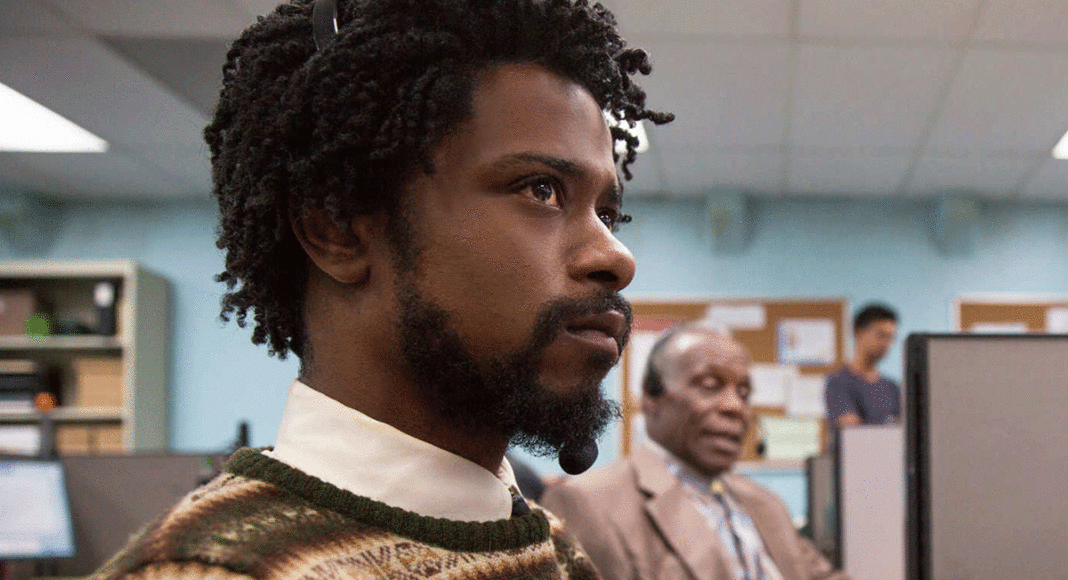Sometimes it seems like it’s hard to find a movie that really has something to say. Very rarely does one encounter a film like Sorry to Bother You that seems to have everything to say.
There isn’t a frame in this debut from writer-director Boots Riley (previously known for leading Oakland hip-hop group the Coup) that doesn’t seem to be working on multiple levels. Hell, even the title is loaded with subtext: the phrase is something a telemarketer like the movie’s protagonist Cassius Green (Lakeith Stanfield) might say. It’s also an important line at the end of the film in an entirely different context. But more than that, it’s what Riley himself is saying to anyone who doesn’t want his movie to make them think about race and class.
There’s a constant meta-narrative winding through the film, like the way the earrings that Cassius’ girlfriend Detroit (Tessa Thompson) wears, and the photo of his deceased dad in his cubicle, constantly change to comment on the twists and turns.
So it’s whip-smart, for sure, and the best politically conscious movie to come out in a long time. But it’s also funny and entertaining as hell. It’s also not a good movie to give away too much about. Halfway through, you’ll still be wondering why this film keeps being described as sci-fi—but, oh man, when you find out … well, you’ll never think of the word “workhorse” the same way again, that’s for sure.
As the film opens, Cassius, who lives in Oakland, is trying to scam his way into a telemarketing job. Turns out he doesn’t have to— “I’ll hire damn near anyone,” his boss reassures him. Why? Well it turns out no one cares who’s doing what at the bottom of the corporate heap. But when Danny Glover as a fellow telemarketer shows Cassius how to find his “white voice”—the keys are imagining “you don’t really need this money” and “you’ve never been fired, only laid off”—Cassius’ career starts to take off. (His “white voice” is provided by David Cross, and it never stops being hilarious, one of the film’s most brilliant satirical touches.)
The comedy here reaches deeper into the absurdity of the workplace than Mike Judge ever got, as Cassius becomes a Power Caller, angering his friends who are trying to unionize. There’s a lot of wonderfully subtle stuff (when Cassius asks for “40 on 2” at the gas station, it’s 40 cents) and even better over-the-top ridiculousness (like the insane number of digits in the Power Caller elevator passcode, or the way that same elevator tells him things like “you are in your sexual prime, the top of the reproductive pile”).
The material is also ripe for visual experimentation by Riley, who clearly had a blast bringing this story to life. When Cassius starts cold calling and his desk suddenly drops into the home of whoever he’s talking to, it’s a genuinely original way to make us look at human interaction. What if we didn’t have the facelessness of the phone—and by extension, the internet? How would we treat each other differently? How would we change what we say?
There aren’t inherent heroes here, only ordinary people who have the potential to act heroically. Nobody is flawless; Detroit is self-righteous about Cassius’ upward mobility, but part of that is simply masking her own guilt about selling art to rich people—her life experience is being consumed by the ruling class—and Cassius sees right through her, just as she does him. And nobody is truly bad, except for CEO Steve Lift (Armie Hammer), who runs a company called WorryFree that provides the mysterious conspiracy that eventually pushes this whole movie into Crazytown—and I mean that in the best way possible.
All of the supporting cast is solid, but the real revelation is Stanfield, who is the perfect actor to convey both the lightness and the heaviness of this material. He’s got an easy warmth and empathy even when he’s trying to convince himself he can be a “monster” at this capitalist game.
Sorry to Bother You is part of a particularly woke moment at the movies. Last year’s Get Out (which featured Stanfield as the haunted Andre) proved a horror movie that did for race issues what The Stepford Wives did for feminism could be a blockbuster hit, and even win an Oscar. The First Purge took an action-horror franchise that’s been getting better with every film and turned the sociopolitical commentary to 11, focusing on African-American characters for the first time. (“People are very resistant to thinking that you can make the world a better place through a horror movie,” Jason Blum, the producer of both Get Out and The First Purge, told me in a recent interview. “But you can.”) Spike Lee’s upcoming BlacKkKlansman, remarkably, also features an African-American character who has to find his “white voice,” in this instance to bait the KKK over the phone. And the indie flick Blindspotting, also set in Oakland and politically charged, languished for years before becoming bankable.
Of all these films, Sorry to Bother You may be the most important, but its importance is ironically the hardest to explain. It’s in its layers of meaning, sure, but even more so in the way its humanist heart and values shine through in every scene. When one of his co-workers tells Cassius “just do right from now on,” we see how all of Riley’s subtext can boil down to something gorgeously simple and relatable to all of our lives.
SORRY TO BOTHER YOU
Written and directed by Boots Riley. Starring Lakeith Stanfield, Tessa Thompson, Terry Crews and Armie Hammer. Rated R. 115 minutes.













